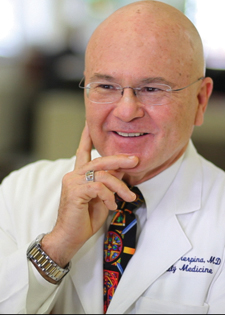 By Victor S. Sierpina, MD
By Victor S. Sierpina, MD
As I am engaged in telehealth visits with patients and interactions with students and residents, there is an undercurrent of anxiety. What last month was a stressful job, is now the stress of being out of one. Concerns about children and family have been expanded to concerns about public and personal health and safety in a pandemic.
I have also rediscovered the resilience of people. Talking with patients and learners, I am surprised and invigorated by their silent courage to survive, to endure, to thrive. I don’t hear echoes of panic. I hear hope, faith, and an enduring human spirit.
Like the silent courage of nature springing up around us, we as humans are well equipped to overcome hardship and disaster. We face it with new innovations, better ways of doing things. We now are starting to remember how to support one another, connecting as a global family sharing the same universal challenges.

So how do we face anxieties, both those that occur day-to-day, and those that are generated in a time like this of crisis and uncertainty?
Let’s start with traditional methods.
Interestingly, these days churches are closed but liquor stores remain open. For people of faith, the idea of a “Let go and let God” process can release us from the burden of imagining the worst or trying to control things beyond ourselves. All faith traditions seek protection in their divinity or divinities.
The process of CBT or Cognitive Behavioral Therapy to me seems rooted in such ancient spiritual practices. CBT is an evidence-based process of dealing with anxiety by helping us change the way we think about our world. It mirrors the way people of faith have used psalms, hymns, prayers, and sacred verses to replace their intrusive thoughts and worries. By creating a new pathway for our thoughts to go, we find a way to change how our emotions flow.
Another well-established method for managing anxiety and stress is meditation. In its many forms, meditation has grown from many sources. Meditation has been practiced around the world, from Jewish Kabbalah, Zen Buddhism, Christian mysticism, Mindfulness Based Stress Reduction (MBSR), Transcendental Meditation (TM), shamanic practices, mystery schools, and others. Contemporary studies using functional MRI scans of meditators found profound changes in their brain activity, including impact on the hippocampus and other areas of the brain impacting emotion. Mindfulness and the calm growing from meditation can help us to quiet our tides of anxiety and worry and return to a here and now that is free to experience life in the moment.
There are as many other methods for dealing with stress and anxiety as there are people. Ultimately it comes down to an individual’s practices, perspectives, and preferences. These days there are apps like Headspace and Calm that allow our phones to feed us relaxing scripts. The Relaxation and Stress Reduction Workbook by Martha Davis has sold over a million copies and now in its 6th edition is one of my “go to” recommendations. It offers a broad menu of options from mindfulness, breathing exercises, biofeedback, progressive muscle relaxation, physical exercise, imagery and more. The internet is replete with websites and products to assist in reaching great calmness and peace.

Of course, some folks prefer the direct use of various substances to help manage their stress. This is likely how many of our addictions are initiated. Remember that the liquor store, the green pharmacy, the prescription meds can all play a legal, important, though tricky role in helping managing stress. Wine and liquor sales have rocketed, in some places as much as 300% during the pandemic. Folks seem to know what helps them. Caution is indicated.
Other options that can influence our mood include herbs like valerian, chamomile, passionflower, kava and supplements such as magnesium, omega-3 fatty acids, CBD oil, B vitamins such as B6 with folate in B100 complex, and 5-Hydroxytryptophan.
Let us not forget the role of socialization in managing stress while social distancing is in place. Talking through our issues with trusted friends and family, even remotely by phone or on social media can be a powerful outlet. Enjoy time with kids; walk, bike, run, play. Social neuroscience tells us that isolation and loneliness depress immunity, increases anxiety and depression, and long term are as bad for us as smoking ½ pack of cigarettes as day.
At the end of this rough water, we hopefully will have grown into a more connected society, more in touch with the values that matter, and enter a time of smoother sailing for all mankind. Realization of our shared vulnerability reminds us of our shared humanness.
I am reminded by a quote from Archbishop Desmond Tutu:
You show your humanity by how you see yourself not as apart from others but from your connection to others.


